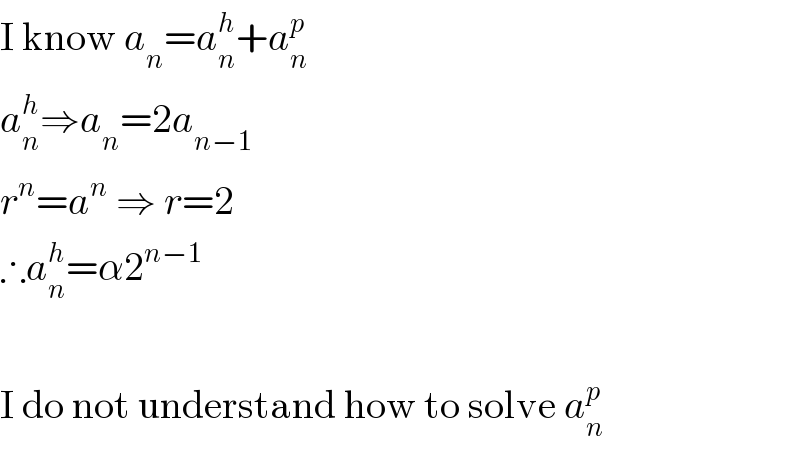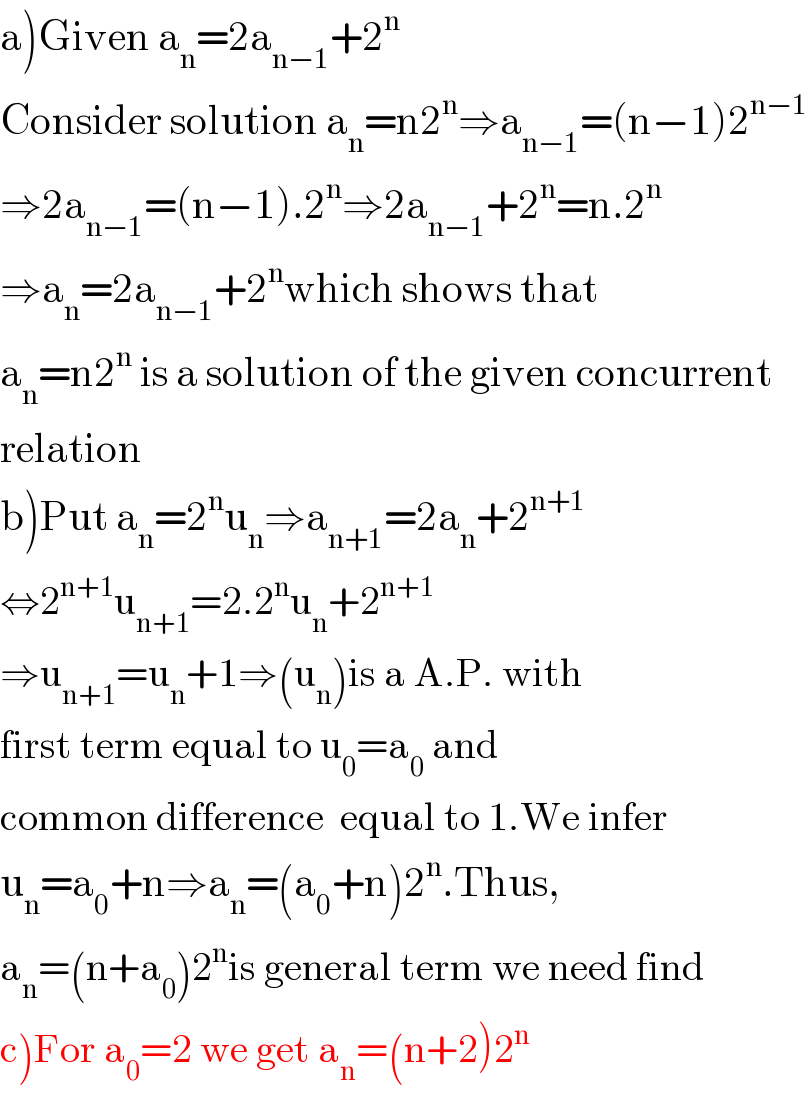Question Number 119250 by Pengu last updated on 23/Oct/20

Commented by Pengu last updated on 23/Oct/20

$$\mathrm{I}\:\mathrm{know}\:{a}_{{n}} ={a}_{{n}} ^{{h}} +{a}_{{n}} ^{{p}} \\ $$$${a}_{{n}} ^{{h}} \Rightarrow{a}_{{n}} =\mathrm{2}{a}_{{n}−\mathrm{1}} \\ $$$${r}^{{n}} ={a}^{{n}} \:\Rightarrow\:{r}=\mathrm{2} \\ $$$$\therefore{a}_{{n}} ^{{h}} =\alpha\mathrm{2}^{{n}−\mathrm{1}} \\ $$$$\: \\ $$$$\mathrm{I}\:\mathrm{do}\:\mathrm{not}\:\mathrm{understand}\:\mathrm{how}\:\mathrm{to}\:\mathrm{solve}\:{a}_{{n}} ^{{p}} \\ $$
Commented by Pengu last updated on 23/Oct/20
Also, hello. I am not new. I am Filup, and have used this app for many years, but forgot my various account details. I wonder if anyone remembers me �� Filup, FilupErwinSmith, and Penguin have been my previous aliases. I am finally doing a mathematics degree, after many years.
Commented by mr W last updated on 23/Oct/20

$${welcome}\:{back}\:{sir}! \\ $$$${i}\:{still}\:{remember}\:{the}\:{discussion}\:{about} \\ $$$${the}\:{interesting}\:{question}\:\mathrm{12883}\:{from} \\ $$$${you}\:{some}\:{years}\:{ago}. \\ $$
Commented by Pengu last updated on 23/Oct/20

$$\mathrm{I}'\mathrm{m}\:\mathrm{very}\:\mathrm{glad}\:\mathrm{to}\:\mathrm{see}\:\mathrm{you}\:\mathrm{remember}! \\ $$
Commented by prakash jain last updated on 24/Oct/20
Hi Filup, How are you?
Answered by 1549442205PVT last updated on 23/Oct/20

$$\left.\mathrm{a}\right)\mathrm{Given}\:\mathrm{a}_{\mathrm{n}} =\mathrm{2a}_{\mathrm{n}−\mathrm{1}} +\mathrm{2}^{\mathrm{n}} \\ $$$$\mathrm{Consider}\:\mathrm{solution}\:\mathrm{a}_{\mathrm{n}} =\mathrm{n2}^{\mathrm{n}} \Rightarrow\mathrm{a}_{\mathrm{n}−\mathrm{1}} =\left(\mathrm{n}−\mathrm{1}\right)\mathrm{2}^{\mathrm{n}−\mathrm{1}} \\ $$$$\Rightarrow\mathrm{2a}_{\mathrm{n}−\mathrm{1}} =\left(\mathrm{n}−\mathrm{1}\right).\mathrm{2}^{\mathrm{n}} \Rightarrow\mathrm{2a}_{\mathrm{n}−\mathrm{1}} +\mathrm{2}^{\mathrm{n}} =\mathrm{n}.\mathrm{2}^{\mathrm{n}} \\ $$$$\Rightarrow\mathrm{a}_{\mathrm{n}} =\mathrm{2a}_{\mathrm{n}−\mathrm{1}} +\mathrm{2}^{\mathrm{n}} \mathrm{which}\:\mathrm{shows}\:\mathrm{that} \\ $$$$\mathrm{a}_{\mathrm{n}} =\mathrm{n2}^{\mathrm{n}} \:\mathrm{is}\:\mathrm{a}\:\mathrm{solution}\:\mathrm{of}\:\mathrm{the}\:\mathrm{given}\:\mathrm{concurrent}\: \\ $$$$\mathrm{relation} \\ $$$$\left.\mathrm{b}\right)\mathrm{Put}\:\mathrm{a}_{\mathrm{n}} =\mathrm{2}^{\mathrm{n}} \mathrm{u}_{\mathrm{n}} \Rightarrow\mathrm{a}_{\mathrm{n}+\mathrm{1}} =\mathrm{2a}_{\mathrm{n}} +\mathrm{2}^{\mathrm{n}+\mathrm{1}} \\ $$$$\Leftrightarrow\mathrm{2}^{\mathrm{n}+\mathrm{1}} \mathrm{u}_{\mathrm{n}+\mathrm{1}} =\mathrm{2}.\mathrm{2}^{\mathrm{n}} \mathrm{u}_{\mathrm{n}} +\mathrm{2}^{\mathrm{n}+\mathrm{1}} \\ $$$$\Rightarrow\mathrm{u}_{\mathrm{n}+\mathrm{1}} =\mathrm{u}_{\mathrm{n}} +\mathrm{1}\Rightarrow\left(\mathrm{u}_{\mathrm{n}} \right)\mathrm{is}\:\mathrm{a}\:\mathrm{A}.\mathrm{P}.\:\mathrm{with} \\ $$$$\mathrm{first}\:\mathrm{term}\:\mathrm{equal}\:\mathrm{to}\:\mathrm{u}_{\mathrm{0}} =\mathrm{a}_{\mathrm{0}} \:\mathrm{and}\: \\ $$$$\mathrm{common}\:\mathrm{difference}\:\:\mathrm{equal}\:\mathrm{to}\:\mathrm{1}.\mathrm{We}\:\mathrm{infer} \\ $$$$\mathrm{u}_{\mathrm{n}} =\mathrm{a}_{\mathrm{0}} +\mathrm{n}\Rightarrow\mathrm{a}_{\mathrm{n}} =\left(\mathrm{a}_{\mathrm{0}} +\mathrm{n}\right)\mathrm{2}^{\mathrm{n}} .\mathrm{Thus}, \\ $$$$\mathrm{a}_{\mathrm{n}} =\left(\mathrm{n}+\mathrm{a}_{\mathrm{0}} \right)\mathrm{2}^{\mathrm{n}} \mathrm{is}\:\mathrm{general}\:\mathrm{term}\:\mathrm{we}\:\mathrm{need}\:\mathrm{find} \\ $$$$\left.\mathrm{c}\right)\mathrm{For}\:\mathrm{a}_{\mathrm{0}} =\mathrm{2}\:\mathrm{we}\:\mathrm{get}\:\mathrm{a}_{\mathrm{n}} =\left(\mathrm{n}+\mathrm{2}\right)\mathrm{2}^{\mathrm{n}} \\ $$
